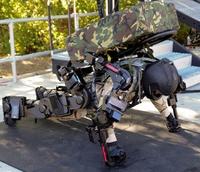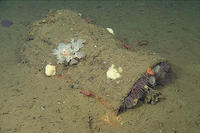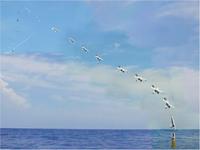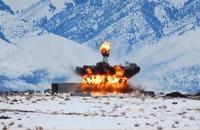-
Military technology outpaces laws of war

Today’s emerging military technologies — including unmanned aerial vehicles, directed-energy weapons, lethal autonomous robots, and cyber weapons like Stuxnet — raise the prospect of upheavals in military practices so fundamental that they challenge long-established laws of war. Weapons that make their own decisions about targeting and killing humans, for example, have ethical and legal implications obvious and frightening enough to have entered popular culture (for example, in the Terminator films). The current international laws of war were developed over many centuries and long before the current era of fast-paced technological change.
-
-
U.S. Air Force plans to add 1,000 new cybersecurity personnel
Budget cuts notwithstanding, the U.S. Air Force plans to add 1,000 new personnel between 2014 and 2016 as part of its cybersecurity units. The 24th Air Force at Joint Base San Antonio-Lackland, Texas is home to the U.S. Air Force cyber command. With a budget of about $1 billion and a staff of roughly 400 military and civilian personnel, the command oversees about 6,000 cyber defense personnel throughout the Air Force.
-
-
Guards at U.K. nuclear weapons facility slept on the job, skipped routine patrols
Police officers of the U.K. Ministry of Defense police, assigned to guard Britain’s nuclear weapons, are under investigation after it has been reported that they had slept on the job and failed to complete routine patrols at a nuclear weapons facility. The Atomic Weapons Establishment (AWE) in Burghfield, Berkshire, is the location of the complex final assembly of nuclear weapons, and also where the U.K. nuclear warheads are maintained and decommissioned.
-
-
Hezbollah blames Israel, but assassinated leader had many enemies

Hassan al-Lakkis, the man considered to be Hezbollah’s tech expert, known for his expertise with drones, bombs, and other gadgets, was assassinated near his home last week. Al-Lakkis’s body was not yet cold when Hezbollah operatives began to blame Israel for the assassination, despite al-Lakkis’ long list of enemies. Hezbollah’s support of Syrian President Bashar al-Assad has gained it a long list of enemies, and many experts insist that the assassination of al-Lakkis does not resemble an Israeli-styled operation.
-
-
EU to fund improved C3IS capabilities for African-led security operations
The EU on Friday confirm it will provide 12.5 million euros through its African Peace Facility to improve the command, control, communication, and information system (C3IS) used in African-led peace support operations. Since 2004 the EU has provided 1.1 billion euros to support peace and security operations in Africa.
-
-
Survey of deep-sea chemical munitions dump off California finds no chemical weapons

Since the Second World War, U.S. nautical charts have shown seven “chemical munitions dumping areas” along the Pacific Coast between San Francisco and the Mexican border. Little or no information, however, is available about the amount, location, or nature of the materials that were dumped at most of these sites. Researchers from the Monterey Bay Aquarium Research Institute (MBARI) conducted a detailed survey of one supposed deep‐water dump site off Southern California, and found that it contained no chemical munitions. The researchers conclude that not all sites marked as chemical munitions dumps may actually have been used for this purpose.
-
-
U.S. “bomb library” marks 10-year anniversary
It has been ten years since the FBI established the Terrorist Explosive Device Analytical Center (TEDAC), and since that time the multi-agency operation — sometimes referred to as America’s bomb library — has become an important tool in the nation’s fight against terrorism. Since its creation in 2003, TEDAC has examined more than 100,000 IEDs from around the world and currently receives submissions at the rate of 800 per month. Two million items have been processed for latent prints — half of them this year alone.
-
-
India-Pakistan nuclear war would lead to world-wide famine: study
An India-Pakistan nuclear war may see the use of about 100 Hiroshima-size bombs – about half of India and Pakistan’s nuclear arsenals. A new study says that a nuclear exchange on such a scale would “probably cause the end (of) modern industrial civilization as we know it” by subjecting about two billion people to the risk of starvation, and causing massive economic and social disruptions far away from the theater of war. Among the consequences of a nuclear exchange: Chinese winter wheat production could decline by 50 percent during the first year and by more than 30 percent over ten years; there would be a 21 percent decline in Chinese middle-season rice production during the first four years and an average 10 percent decline in the following six years; corn and soybean production in the United States would decline by 10 percent on average for ten years.
-
-
U.S. aircraft to fly African troops to the Central African Republic mission
U.S. military aircraft will fly African and European peacekeepers to the Central African Republic to help contain a bloody internal conflict between Christian and Muslim militias and other rebel factions. The country has been in chaos since Muslim militias ousted President Francois Bozize in March. The initial mission of the U.S. transport planes will be to fly troops from Burundi to the Central African Republic capital of Bangui.
-
-
DoD sound protection standards for secret spaces are insufficient
What is the best place to conduct a conversation about a confidential or even classified matter? Surprisingly, probably not a conference room designed in accordance with acoustical criteria approved by the Department of Defense (DOD). While such “secret” rooms — intended to keep sensitive information out of the earshot of unauthorized listeners — might meet DOD standards, they offer less protection against snooping than is found in a luxury condo.
-
-
Is the time finally right for a pan-African security force?
Representatives of fifty-three African states, meeting at an African summit in Paris last week, emphasized the need for a pan-African military force. Observers note that this is not a new idea – it was first raised Ghana’s first president Kwame Nkrumah in 1963 — but that on those few occasions when efforts were made to translate the idea into reality, it has never worked. Notwithstanding the many failures of the past, and the many warning signs of the present, many African leaders and observers are optimistic that this time, the 50-year old dream of a pan-African military force may well be realized.
-
-
UN approves intervention in Central African Republic as violence rages

The UN Security Council yesterday voted for a resolution, put forward by France, which authorized an African Union-led peacekeeping force to intervene in the Central African Republic to prevent the growing chaos from causing the state to disintegrate. The AU force, with the support of French forces, will protect civilians, restore humanitarian access, and stabilize the country. UN officials have warned that the violence between the Christian majority and Muslim minority now in power could lead to genocide.
-
-
U.S. Navy demonstrates UAV launch from submerged submarine

The U.S. Naval Research Laboratory (NRL) demonstrated the launch of an all-electric, fuel cell-powered, unmanned aerial system (UAS) from a submerged submarine. The successful submerged launch of a remotely deployed UAS offers a pathway to providing mission critical intelligence, surveillance, and reconnaissance (ISR) capabilities to the U.S. Navy’s submarine force.
-
-
France reasserting its role as Africa's indispensable power
In March this year, rebel militias, many composed of Muslim fighters from Chad and Sudan, overthrew the government, a move which has resulted in spreading lawlessness among rival warlords, with the risk of the disintegration of the country and sectarian war spilling beyond the country’s borders distinct possibilities. As was the case in Mali earlier this year, France has decided to put its foot down, sending hundreds of troops to the capital Bangui to restore order and restrain the lawless rebels. “The challenge of this intervention [in the Central African Republic],” on analyst wrote, “lies in the ‘return’ of France to the dark continent after decades of interference followed by a period of relative indifference or misstatements. If France succeeds in its Central African mission, it will have recovered a good part of its influence, positioning itself as an indispensable partner in those places where it risked becoming a vague memory.”
-
-
Testing explosives capability helping armor research

In modern warfare, military vehicles use enormous armored panels to defend against weapons. Boosting protection by adding more steel, however, eventually makes equipment too heavy to use. There are other ways to defend against a weapon besides trying to stop it with just mass — smarter, more economic ways that are waiting to be discovered.
-
More headlines
The long view
Bookshelf: Smartphones Shape War in Hyperconnected World
The smartphone is helping to shape the conduct and representation of contemporary war. A new book argues that as an operative device, the smartphone is now “being used as a central weapon of war.”
